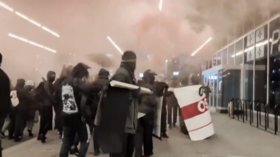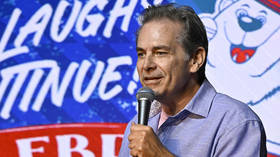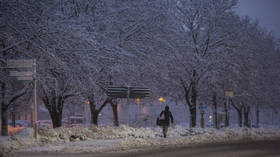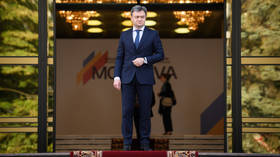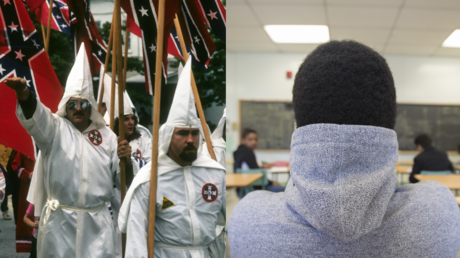Guardian all alone as MSM fail to corroborate Assange/Manafort ‘dud’ story
The Guardian’s ‘bombshell’ story that ex-Donald Trump adviser, Paul Manafort, met with Wikileaks Julian Assange is falling apart, as outlets fail to corroborate the claims, some even questioning the paper’s standards.
On November 27, the Guardian splashed with an eye-catching article, claiming that its journalists had seen an Ecuadorian intelligence agency document detailing that Manafort and Assange had met three times in the London Ecuadorian embassy, including during the run-up to the 2016 US Presidential Election.
The piece suggested that “Russians” were also guests at the embassy, though it failed to identify any individuals in question. The article also didn’t include any non-anonymous sources nor did it reproduce, in any capacity, the document in question.
The story didn’t quite have the impact desired, instigating an ongoing debate even among the most ardent members of so-called ‘Resistance.’
I love the Guardian. And this needs to be resolved. Did Assange meet Manafort? Who are the sources? If you can't say then doubt. Anonymous sourcing is dangerous at best. https://t.co/PR6YQt6I0g
— Jimmy Wales (@jimmy_wales) November 27, 2018
Not all use of anonymous sources is valid or persuasive to the public. If we don't draw the line somewhere, then we have to believe anyone who claims that "Oh, I have a source". Judgment is needed.
— Jimmy Wales (@jimmy_wales) December 3, 2018
It wasn’t only the article’s contents that were called into question. The piece, penned by Luke Harding, the paper’s one time Russia correspondent, and Dan Collyns, was written in collaboration with Fernando Villavicencio a self-styled Ecuadorian journalist/activist. While Villavicencio’s name appeared on the byline in the Guardian’s print version, it wasn’t included in the more widely read online iteration.
Guardian hid third author of fabricated front page story "Manafort Held Secret Meetings With Assange in Embassy" from international public -- as revealed by direct digital archive library. Compare to the online version. Villavicencio background:.https://t.co/KX80IrScylpic.twitter.com/8uVqA8eLm5
— WikiLeaks (@wikileaks) December 3, 2018
The discrepancy could be due to claims, referenced by journalists Ben Norton, among others that the Villavicencio has faced ‘repeated accusations of fabrications.’
This is wild: The Guardian concealed that its "report" on Manafort supposedly meeting Assange (which @WikiLeaks revealed is false) was co-written by Fernando Villavicencio, an anti-Correa opposition activist who has been repeatedly accused of fabricationshttps://t.co/Lj03mdSyQT
— Ben Norton (@BenjaminNorton) December 4, 2018
While criticism from Wikileaks, who have a long-standing feud with the Guardian is unsurprising, the publication is now facing attack from fellow liberal outlet the Washington Post, among others.
Veteran Post reporter Paul Fahri raised issues with the Guardian, writing that the story could well be “a dud,” adding that “No other news organization has been able to corroborate the Guardian’s reporting to substantiate its central claim of a meeting.”
The criticism comes as an ex-Ecuadorian diplomat Fidel Narváez slammed the story, telling the Canary: “I find it incredible that the Guardian allows these people [Luke Harding and Dan Collyns] to repeatedly damage the paper’s credibility and reputation.”
The Guardian has made an attempt to dilute the story, changing the original article by inserting qualifiers. For example, “the meeting” between Assange and Manafort, became “the apparent meeting,” while the headline was changed adding in “sources say” from the more definitive original: “Manafort held secret talks with Assange.”
READ MORE: ‘Fake story’: Ecuadorean diplomat blasts Guardian’s Assange-Manafort meeting report
The publication’s spokesperson, quoted in the post, stated: “This story relied on a number of sources. We put these allegations to both Paul Manafort and Julian Assange’s representatives prior to publication. Neither responded to deny the visits taking place. We have since updated the story to reflect their denials.”
The Guardian had reported that their article “could shed new light” on the leaked Hillary Clinton emails, Russian hackers and the rise of Trump, in fact, the publication has only illuminated accusations of its own inadequacies and falling standards.
Like this story? Share it with a friend!
Subscribe to RT newsletter to get stories the mainstream media won’t tell you.



